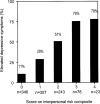Social support and social conflict as predictors of prenatal depression
- PMID: 17601908
- PMCID: PMC2276880
- DOI: 10.1097/01.AOG.0000265352.61822.1b
Social support and social conflict as predictors of prenatal depression
Abstract
Objective: To estimate how social support and social conflict relate to prenatal depressive symptoms and to generate a brief clinical tool to identify women at increased psychosocial risk.
Methods: This is a prospective study following 1,047 pregnant women receiving care at two university-affiliated clinics from early pregnancy through 1 year postpartum. Structured interviews were conducted in the second trimester of pregnancy. Hierarchical and logistic regressions were used to examine potential direct and interactive effects of social support and conflict on prenatal depressive symptoms measured by the Center for Epidemiologic Studies-Depression Scale.
Results: Thirty-three percent of the sample reported elevated levels of depressive symptoms predicted from sociodemographic factors, social support, and social conflict. Social support and conflict had independent effects on depressive symptoms although social conflict was a stronger predictor. There was a "dose-response," with each increase in interpersonal risk factor resulting in consequent risk for probable depression based on symptom reports (Center for Epidemiologic Studies-Scale greater than or equal to 16). A composite of one social support and three conflict items were identified to be used by clinicians to identify interpersonal risk factors for depression in pregnancy. Seventy-six percent of women with a composite score of three or more high-risk responses reported depressive symptoms.
Conclusion: Increased assessment of social support and social conflict by clinicians during pregnancy can identify women who could benefit from group or individual interventions to enhance supportive and reduce negative social interactions.
Figures

References
-
- Paarlberg KM, Vingerhoets AJ, Passchier J, Heinen AG, Dekker GA, van Geijn HP. Psychosocial factors as predictors of maternal well-being and pregnancy-related complaints. J Psychosom Obstet Gynaecol. 1996;17:93–102. - PubMed
-
- Seguin L, Potvin L, St-Denis M, Loiselle J. Chronic stressors, social support, and depression during pregnancy. Obstet Gynecol. 1995;85:583–9. - PubMed
-
- Hogan BE, Linden W, Najarian B. Social support interventions–do they work? Clin Psychol Rev. 2002;22:383–442. - PubMed
-
- Pagel MD, Erdly WW, Becker J. Social networks: we get by with (and in spite of) a little help from our friends. J Pers Soc Psychol. 1987;53:793–804. - PubMed
-
- Rook KS. The negative side of social interaction: impact on psychological well-being. J Pers Soc Psychol. 1984;46:1097–108. - PubMed
Publication types
MeSH terms
Grants and funding
LinkOut - more resources
Full Text Sources
Medical

